Bridge - The Scotsman 01/06/13


South’s belated entry into the auction suggests a flawed Weak Two opener, but does not deter you from bidding game. North leads the three of spades to South’s ace, and South switches to the nine of diamonds, which looks rather like a singleton. You want to draw trumps to avoid losing a ruff – how should you set about it? In isolation the best line with this holding is to take two finesses, losing just one trick whenever the honours are split, or South has KQx, but is that the right thing to do when a ruff threatens? Ace and another is nearly as good, winning against any 2-2 break, or singleton honour, but losing out to KQx in South. If North has KQx you are bound to lose two tricks whatever you do. The expert declarer at the table played ace and another heart, but South turned up with KQx. When he won the queen he switched to a club. North had KJxxxx in clubs and declarer had four losers. Would you have done better?
Now that you are playing double dummy it is easy to see that you should win the diamond in dummy and take a heart finesse. But what if North won a singleton honour and gave partner a diamond ruff? That would give you two heart losers, but it would not beat the contract – when South switches to a club you win the ace, draw the last trump with the ace and discard your club loser on a diamond.
Advertisement
Hide AdAdvertisement
Hide AdThe deal is noteworthy in that the declarer who failed to take the best


line was none other than the late Terence Reese – so if you went wrong you are in the best company. And you can further console yourself with the fact that North-South should certainly bid to 4S, which makes if they guess clubs correctly.